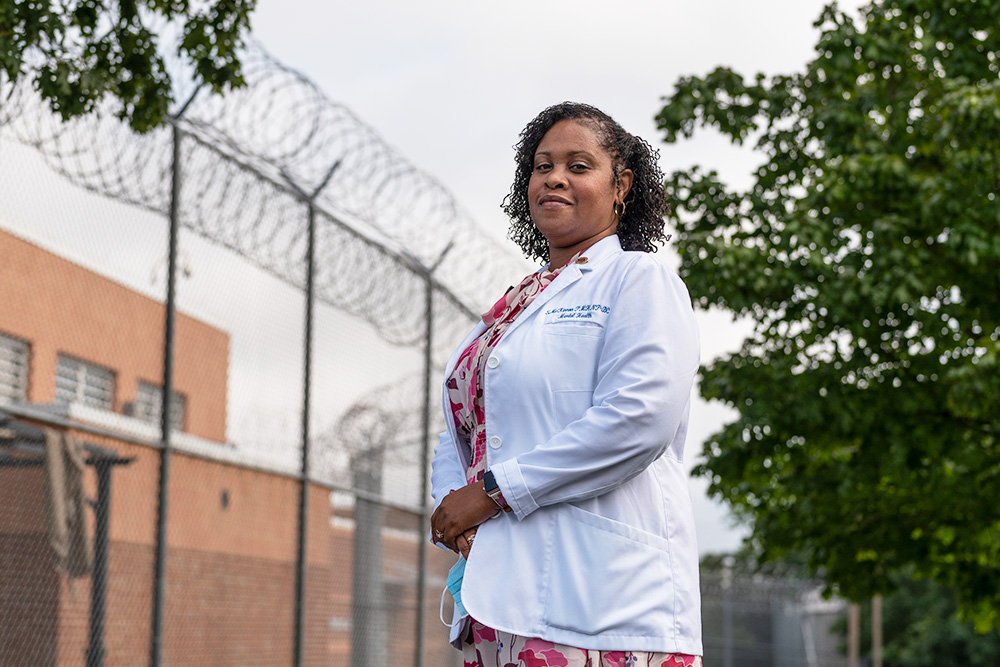Student in Focus: Meet Shaune McKinnon

When Shaune McKinnon (MSN ’19) accepted the position as director of mental health at the Albemarle-Charlottesville Regional Jail last December, the psychiatric nurse practitioner had expansive ideas to transform services for the 400 or so men and women housed there.
400+
Number of inmates in the Albemarle-Charlottesville Regional Jail for whom NP Shaune McKinnon provides mental health care
With colleague Renae Vance, a licensed clinical social worker, and two fellow nurses on her team, she’d expand peer-to-peer support groups for men and establish new trauma-informed care models and counseling programs for female inmates. She’d make her office an oasis—with a couch, framed art, less-fluorescent lighting—for the half-hour, one-on-one therapy sessions she held. Just as she’d done as a nurse in Suffolk and Henrico County prisons, she’d offer a trademark blend of respect, humanity, authenticity, and warmth, using “every bag of tricks [she’d] learned as a nurse” to make people feel safe, supported, and seen.
But when COVID struck, derailing all group gatherings, and unnerving inmates and staff alike, McKinnon shifted, too. Donning a mask, she pivoted to the need that swelled around her.
“It’s changed my work because it’s greatly expanded my client base,” said McKinnon, who is also a DNP student. “Coworkers, inmates, families: a lot of people are coming to speak to me. Anxiety is through the roof. Everyone’s feeling that loss of power, that loss of control.”
For those who are incarcerated, or awaiting trial, stress is already acute. Add to that fears of exposure, slowing legal processes, and worry over family members’ propensity to contract COVID, and the prison—like the world outside—roiled with uncertainty. McKinnon, who keeps an AirPod nestled in one ear, rarely lets calls go to voicemail, and responds promptly to texts and emails, quickly determined to keep ahead of crises.
“These walls are not going to yield, and when you’re feeling bad, there’s no place here that’s soft,” she said. “So that’s what I try to do with my conversations. Inmates want to talk. They want to know how I am, how my family is, to say how they feel. Mostly, they want to be spoken to like a human being; that’s what helps with anxiety the most.”
In addition to formal assessments, medication management, and emergency interventions, McKinnon’s work happens in informal ways, too. She visits inmates in their cells and uses all her senses— “how they smell, whether they look tattered, whether they look me in the eye”—to assess a potential tipping point. Never focusing on crimes, she kindly but firmly probes their backstories to determine the strength of their support networks and history of trauma. Her ear constantly to the ground, she never chides if they return to prison but instead reframes the situation: perhaps they were out longer than the last time. Baby steps.
“These walls are not going to yield, and when you’re feeling bad, there’s no place here that’s soft. So that’s what I try to do with my conversations. Inmates want to talk. They want to know how I am, how my family is, to say how they feel. Mostly, they want to be spoken to like a human being; that’s what helps with anxiety the most.”
Shaune McKinnon, nurse practitioner and DNP student
She offers a bit of normalcy in a place that can feel anything but. During private counseling sessions, her office door is closed. She stops inmates in the hall to ask after a new baby, or girlfriend. She responds immediately when an inmate reaches out, urging them: “Call me.” She relates through her own backstory, her race, geography (McKinnon is “a Bronx girl”), through kindness, and time. And when a prisoner growls to be left alone, she never complies.
“Staying in front of things—I believe in that,” said McKinnon. “It’s the same patient-centered care I’d provide in a hospital. Why should it be any different in a correctional setting?”
Jail superintendent Col. Martin Kumer calls McKinnon “amazing,” and calls her communication style “her greatest asset.”
“All of the knowledge and training will not do any good,” said Kumer, “if you can’t gain the trust of the person you’re serving.”
To Vance, she’s a confidante, fellow professional, and friend. And UVA nursing faculty love the cerebral, passionate presence she brings to the classroom.
“Not only is she an incredible clinician, she has a truly kind heart, and always exemplifies the core tenets of the advanced practice nursing model in being a true advocate for patients,” said assistant professor Olivia Reichenbacker, coordinator of the psychiatric-mental health nurse practitioner program.
Still, the job isn’t easy. But McKinnon—intensely tethered to her work—calls it gratifying, exhausting, often jubilant work. A calling, she says, to work with people who are often “diamonds in the rough.”
“For many patients, their traumas started so young,” said McKinnon. “They’ve suffered things that are sometimes hard to hear and imagine. I often hear them say, ‘I can’t get my footing on the outside, I keep coming back here.’ We get that here. I tell them, ‘I know you’re angry, but I see you, I hear you. And you’ve got to stay on track.’ Every human being wants that.”
“They are part of our community,” she added. “We can’t lock them away and dismiss them; they’re part of us. And they want to be.”
###
